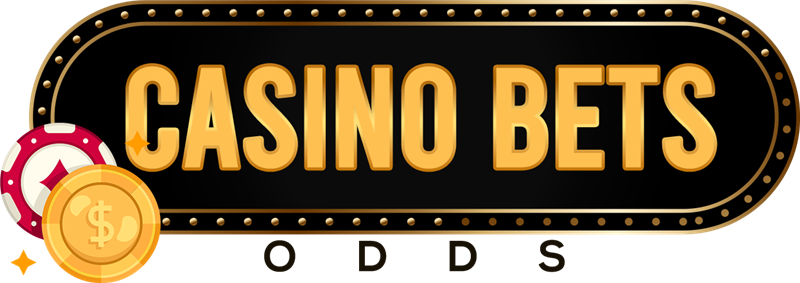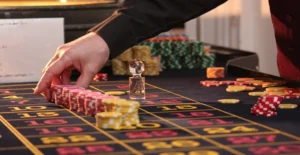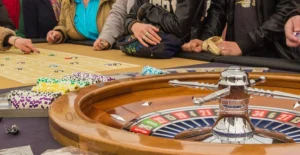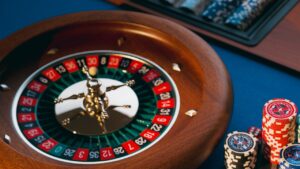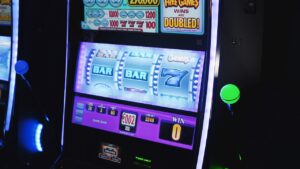I’ve been curious about the pace of bingo lately, especially when I’m planning my weekend activities. It’s not always clear how long a single game might last, or even a whole session. So, I decided to look into it, trying to figure out the typical timings involved in playing bingo. My goal is to help others understand this, too, so we can all manage our time better when we decide to play.
Key Takeaways
- A single bingo game usually takes between 3 to 6 minutes to complete.
- Factors like the number of balls used (75 or 90) and how quickly numbers are called can change how long a game lasts.
- Speed bingo variants are much quicker, with games often finishing in under a minute.
- Online bingo games tend to be faster than in-person games because the computer marks the cards automatically.
- A full bingo session can vary a lot, but typically lasts from 1 to 3 hours, depending on how many games are played and if there are breaks.
How Long Does a Bingo Game Typically Take?
So, you’re wondering, “How long does a game of bingo take?” It’s a fair question, especially if you’re trying to fit a game or two into a busy schedule. Honestly, there isn’t one single answer because it can depend on a few things. But generally speaking, a single game of bingo, from the first ball called to someone shouting “Bingo!”, usually wraps up in about 3 to 5 minutes. It feels pretty quick when you’re in the thick of it, doesn’t it?
Several factors play a role in this timing. The number of balls used in the game is a big one. A 75-ball game, common in the US, will naturally be a bit faster than a 90-ball game, which is more popular in the UK. Then there’s the pace of the caller and, of course, how quickly players mark their cards. Sometimes, you might find yourself waiting a moment for the next ball, and other times it feels like they’re flying out. It’s all part of the fun, I suppose.
The speed of a bingo game can be influenced by the number of balls in play and how quickly the caller announces them. It’s a mix of the game’s structure and the human element.
When I first started playing, I was always trying to time it, trying to figure out the rhythm. It’s interesting to see how different venues or online platforms manage the flow. Some keep things moving briskly, while others allow for a more relaxed pace. If you’re looking for a quick burst of excitement, you might want to check out the faster formats, but for a more traditional experience, these few minutes per game are just right. Understanding these timings can help you plan your bingo sessions effectively.
Average Duration
When I first started playing bingo, I was curious about how long each game took. It feels like it can drag on sometimes, but other times it flies by. So, I did some digging to figure out the average duration from when the caller says “Eyes Down” until someone shouts “Bingo!”.
The Typical Game Flow
Most bingo games follow a pretty standard pattern. The caller announces the numbers, and players mark their cards. The speed at which numbers are called and the pattern needed to win are the main factors. Generally, a single game of bingo can take anywhere from 3 to 8 minutes to complete. This might seem like a wide range, but it depends on a few things.
Factors Influencing Game Length
- Ball Count: The most common American bingo uses 75 balls. Games using fewer balls, like 30-ball or 50-ball bingo, are naturally much quicker. I’ve seen 30-ball games wrap up in under a minute!
- Caller Speed: Some callers are faster than others. A quick caller can speed things up, while a more leisurely pace can extend the game.
- Winning Pattern: Simple patterns, like a single line, usually finish faster than complex patterns that require more numbers to be called.
- Player Engagement: How quickly players mark their cards and are ready for the next number also plays a role. If everyone is paying attention, the game moves along smoothly.
It’s interesting to note that even with the same number of balls and a similar winning pattern, the actual time can still vary. It’s all part of the fun and unpredictability of the game.
Comparing Game Durations
| Game Type | Typical Duration |
Notes |
| 75-Ball Bingo | 3-8 minutes | Most common, standard game |
| 90-Ball Bingo | 5-10 minutes | Common in the UK, longer game |
| 30-Ball Bingo | 1-2 minutes | Very fast-paced, often called “Speed Bingo” |
| 50-Ball Bingo | 2-4 minutes | Quicker than a standard 75-ball |
Understanding these averages helps me plan my bingo time better, especially when I’m looking for a quick game or a longer session. It’s good to know what to expect when you sit down at the table, whether it’s at a local hall or playing online bingo.
What Affects Game Length? Players, Ball Count, and Random Chance
The Ball Count Matters
It might seem obvious, but the number of balls used in a bingo game directly impacts how long it takes. Games using fewer balls, like the speedy 30-ball or 75-ball versions, naturally conclude faster. This is because there are fewer numbers to be called before a player can complete a pattern. Conversely, a 90-ball game, which is common in the UK, requires more numbers to be drawn, extending the game’s duration. It’s a simple matter of probability and the sheer volume of numbers that need to be announced.
Player Numbers and Pace
While not a direct factor in the potential length of a game, the number of players can influence the perceived speed. In a crowded hall, the excitement and the sheer volume of tickets being checked can make the game feel more dynamic. However, the actual time it takes for a winning number to be called remains the same, regardless of how many people are playing. The real impact comes from the caller and the players’ ability to mark their cards quickly. If everyone is on the ball, the game moves along. If there’s a delay in calling or marking, it can drag.
Random Chance and Game Flow
Ultimately, bingo is a game of chance. The sequence in which numbers are called is entirely random. Sometimes, a game can be over in a flash if the winning numbers are called in quick succession. Other times, the numbers needed for a win might be spread out, leading to a longer game. There’s no way to predict this, and that’s part of the fun. You can’t strategize to make a game faster or slower, beyond choosing a game format with a different ball count.
The inherent randomness means that even with the same number of balls and players, no two bingo games will ever take the same amount of time. It’s a delightful unpredictability.
Other Influences
- Caller’s Speed: Some callers are naturally faster than others. A quick caller can speed up the game, while a more leisurely pace will naturally extend it.
- Break Times: In a live setting, there might be short pauses between games for ticket sales or announcements, adding to the overall session time but not the individual game length.
- Ticket Complexity: While most bingo games use standard patterns, some special games might have more complex winning formations, potentially requiring more numbers to be called.
Speed Bingo
If you’re someone who likes things quick, then speed bingo is probably your jam. I’ve found that these games move at a brisk pace. We’re talking about rounds that wrap up in about 30 to 45 seconds. It’s a big change from the more traditional games where you might have a bit more time to chat or grab a drink between calls.
The whole point of speed bingo is to get through as many games as possible in a shorter amount of time. It’s perfect for when you’ve only got a few minutes to spare or if you just prefer a more energetic bingo experience. You have to stay focused because the numbers are called out one after another with very little pause. It’s a different kind of thrill, for sure.
Here’s a quick look at what makes speed bingo different:
- Faster Ball Calls: Numbers are announced much more rapidly than in standard bingo.
- Fewer Numbers: Typically, speed bingo uses cards with fewer numbers, often 30-ball or 40-ball games, making it easier to complete a pattern quickly.
- Quick Wins: Because the games are so fast, you can potentially win multiple times in a short session, which is pretty exciting.
It’s a format that appeals to players who want that constant action, almost like a quick flutter. You don’t get much downtime, so you need to be ready to mark your card as soon as a number is called. It’s a different way to play, and I’ve seen people get into the rhythm of it. It’s not for everyone, of course; some folks prefer a more relaxed pace, but for those who like a bit of a rush, it’s a great option. It reminds me a bit of how fast some poker hands can go; you just have to be ready for anything poker hands can go.
The rapid-fire nature means you need to be sharp. There’s no time to get distracted, or you’ll miss a number, and that can cost you a win. It’s all about concentration and quick reflexes.
Online Bingo vs. In-Hall
When I first started playing bingo, it was all about the smoky halls and the friendly chatter. But as I’ve gotten more into it, I’ve noticed how much faster things move when I play online. It’s a pretty big difference, and I think I know why.
The Pace of Play
One of the main reasons online bingo games zip by is the automation. In a physical hall, the caller has to manually call out each number, and everyone has to mark their cards. This takes time, and there’s always a bit of a lag. Online, the computer handles all of that. Numbers are called out instantly, and your card is marked automatically. This automation alone cuts down game time significantly. It means you’re not waiting for someone to find the next number or for everyone to catch up.
Player Interaction and Distractions
In a bingo hall, a lot is going on. You’ve got people chatting, the general buzz of the room, and sometimes even other games happening. While this is part of the fun for many, it can slow things down. Online, the focus is purely on the game. You might have background music or chat features, but the core gameplay is uninterrupted. It’s just you, your card, and the numbers appearing on the screen. This focused environment lets me get through more games in less time, almost like playing a quick round of keno.
Ticket Purchasing and Game Entry
Buying tickets and entering new games in a hall involves standing in line, handing over cash, and getting physical tickets. Online, it’s usually just a few clicks. You can often buy tickets for multiple games in advance, so when one game ends, you’re automatically ready for the next. This smooth transition is a big time-saver.
Game Variety and Speed
Online platforms often offer a wider range of bingo variations, including faster-paced games. While a traditional game might take several minutes, some online versions are designed to be completed in just a few minutes, or even less. This variety means I can pick a game that fits my available time, whether I have an hour or just fifteen minutes.
Key Differences Summarized
- Automation: Automatic number calling and card marking online versus manual processes in halls.
- Focus: Uninterrupted gameplay online compared to the social distractions in a physical venue.
- Efficiency: Quick ticket purchasing and game entry online versus queues and physical transactions.
- Pace Options: Greater availability of fast-paced game formats online.
Ultimately, the digital nature of online bingo removes many of the physical and social delays inherent in traditional bingo halls. This allows for a much quicker, more streamlined experience for players like myself who want to play more games in a shorter period.
Bingo Session Length
When I first started playing bingo, I wasn’t sure what to expect in terms of how long a whole session would take. It’s not just about one game, after all. A bingo session is a collection of games played over some time, and the total duration can vary. It’s good to have an idea of the time commitment before you head out or log in.
What Is a Bingo Session?
A bingo session is essentially a block of time dedicated to playing multiple bingo games. Think of it like going to a movie; you don’t just watch one scene, you watch the whole film. In bingo, a session usually includes a set number of games, sometimes with short breaks in between. The structure can differ quite a bit depending on where you’re playing, whether it’s a local hall or an online platform.
Games Count, Breaks & Structure
The number of games in a session isn’t always fixed. Some venues might offer a set program with a specific number of games, say 10 or 15. Others might be more flexible. Breaks are also a factor; they can be short, just a few minutes between games, or longer, scheduled breaks. The overall structure is designed to keep things moving while giving players a chance to catch their breath or grab a drink. I’ve noticed that some halls have a very rigid schedule, while online, it feels much more fluid.
Variability in Sessions: From 5 to 30 Games Depending on Venue
I’ve seen sessions that are quite short, maybe only five or six games, which is great if I’m short on time. On the other hand, I’ve also been to longer sessions that pack in 20, 30, or even more games. This depends on the venue and the type of event. A special event might have a longer, more elaborate session, while a regular weeknight might be more streamlined. It’s always a good idea to check the schedule beforehand if you have a specific time limit in mind. For instance, some places might offer a ‘speed bingo’ option, which is much faster, allowing for more games in a shorter period, perhaps up to 80 rounds per hour compared to the usual six. You can find more about these faster formats on pages discussing speed bingo.
Online Sessions: Game Volume and Flexibility Without Fixed Lengths
Online bingo sessions are a bit different. While there are often scheduled games or tournaments, the overall session length can feel more self-directed. You can often choose to play more or fewer games as you please, without the same rigid structure as a physical hall. This flexibility means a session could be as short as 30 minutes or stretch for a couple of hours, depending entirely on how much I want to play and what games are available. It’s a different kind of experience, offering more control over my time.
Quick Session Recap: Typical Ranges for Game and Session Lengths
So, to sum it up, a typical bingo session can range quite a bit. A single game, as we’ve discussed, might take anywhere from a few minutes to maybe 10 minutes. When you multiply that by the number of games in a session, which could be anywhere from 5 to 30 or more, you can see how the total time adds up. I’d say a reasonable estimate for a full session, including breaks and waiting for games to start, is usually between 1.5 to 3 hours. Of course, this is just a general guideline, and your mileage may vary.
What Is a Bingo Session? Games Count, Breaks & Structure
When I talk about a bingo session, I’m not just referring to a single game. Think of it more like a planned event, a block of time dedicated to playing bingo. It’s a collection of individual games played one after another, often with short breaks in between. The structure can vary depending on where you’re playing, whether it’s a local hall or an online platform.
Games Count in a Session
The number of games you’ll play in a session isn’t set in stone. It depends on the venue or the specific event. Some places might run a quick session with just five or six games, while others might have much longer events with ten, fifteen, or even more games. It’s good to check beforehand if you want to know what to expect. For instance, a charity event might have a different game count than a regular weekly game night.
Breaks and Session Structure
Breaks are a pretty standard part of a bingo session. They’re usually short, maybe five to ten minutes, and happen between games or sets of games. This gives people a chance to grab a drink, use the restroom, or just stretch their legs. The overall structure is usually pretty straightforward: announce the game, call the numbers, check for winners, pay out prizes, and then move on to the next game. Some sessions might include special games, like a “coverall” game with a bigger prize, which can sometimes take a bit longer to complete. It’s all about keeping the flow going and making sure everyone has a good time playing their favorite bingo games.
The rhythm of a bingo session is what makes it enjoyable for many. It’s a predictable pattern of calling, marking, and winning, punctuated by brief pauses that keep the energy up without feeling rushed. This structured yet relaxed pace is a big part of the appeal.
Variability in Sessions
When I attend a bingo session, I’ve noticed the number of games can really change from place to place. It’s not just about how fast each game goes, but how many games are packed into the whole event. Some venues might only run about five games from start to finish, keeping things pretty brief. On the other hand, I’ve been to sessions that felt like they went on forever, easily featuring 30 or more games. It depends on what the venue decides to offer.
Factors Influencing Game Count
Several things seem to play a role in how many games are scheduled:
- Promotional Events: Sometimes, special events or holiday parties might have a different game structure than a regular Tuesday night. I remember one Christmas bingo where they had extra prize draws, which meant more games were squeezed in.
- Venue Policies: Each bingo hall or online platform sets its own rules. Some might aim for shorter, more frequent sessions, while others prefer longer ones with more breaks.
- Player Demand: If a lot of people show up and seem keen to play, a venue might add a few extra games. It’s like they want to give everyone a good run for their money.
Typical Session Structures
I’ve seen a few common ways sessions are put together:
- Short & Sweet: These might have 5-10 games, often with quick breaks in between. They’re good if I’m short on time.
- Standard Sessions: Usually around 15-20 games, this feels like the most common setup. It gives you a good amount of playtime without taking up the entire day.
- Marathon Sessions: These are the ones with 25+ games. They often include longer breaks, maybe a meal, and can last for several hours. It’s a big commitment, but the prizes can be pretty good.
The total number of games in a session is a big part of the overall experience. It’s not just about the speed of each round, but the entire package of entertainment offered by the venue. Thinking about how many games are included helps me decide if a session fits my schedule and my budget for the day.
It’s interesting to compare this to other games of chance, like 4 Card Keno, where the pace is often dictated by the player’s choices rather than a fixed session schedule 4 Card Keno. The variability in bingo sessions means I always check the schedule beforehand to know what I’m getting into.
Online Sessions
When I play bingo online, it feels quite different from going to a hall. For starters, there isn’t usually a set number of games that must be played in a single session. It’s more about flexibility. You can often jump into a game that’s just starting or play a few rounds and then stop. This means the total time spent can really vary a lot.
Game Volume and Pace
Online platforms tend to offer a higher volume of games compared to a physical venue. Because the calling is automated and tickets are marked digitally, things move along pretty quickly. You might find yourself playing through several games in the time it would take to finish just one or two in a hall. It’s not uncommon to see sessions where dozens of games are available within an hour or two, depending on the specific room and the type of bingo being played.
Player Choice and Control
One of the biggest differences is the control I have over how long I play. If I only have 30 minutes, I can find a quick game or two. If I have a couple of hours, I can settle in for a longer session. There are no fixed breaks or set end times for the entire group, like you might find at a community hall. It’s all about what I choose to do. This makes it easy to fit bingo into a busy schedule, whether I’m looking for a quick distraction or a more extended gaming experience.
Finding the Right Fit
It’s really about finding the online bingo rooms that match my available time. Some rooms are designed for speed, with very short games, while others might have longer, more traditional rounds. I’ve found that looking at the schedule for a particular site can give me a good idea of what to expect. For instance, some sites might even have special events or tournaments that have a defined start and end, but day-to-day play is usually quite open-ended. It’s a nice way to enjoy the game without feeling rushed or committed to a long block of time. If you’re looking for ways to connect with others virtually, you might even find online team-building games that incorporate bingo elements.
The freedom to play as much or as little as I want is a big draw for online bingo. I can easily adjust my playtime based on my mood or how much time I actually have free.
Session Length Variability
Because there are no fixed session lengths, the total time I spend playing online can range from just a few minutes to several hours. It depends on how many games I decide to play and how quickly they move. Some days I might just play three or four quick games, and other days I might get caught up in a longer session with more complex patterns or bonus games. It’s a very adaptable way to enjoy bingo.
Quick Session Recap
So, we’ve talked a lot about how long individual bingo games can take and what makes them tick. Now, let’s bring it all together with a quick recap of typical time ranges. It’s good to have a general idea so you can plan your bingo outings, whether you’re playing in a hall or online.
Game Length Recap
When I first started playing bingo, I was surprised by how quickly some games could go. Others, though, seemed to stretch on a bit. It depends on the game type and how many numbers are called.
- Speed Bingo: These are the super-fast ones, usually wrapping up in under a minute, sometimes as quick as 30-45 seconds. Perfect if you’re short on time.
- Standard Bingo (90-ball): A typical game of 90-ball bingo, from the first number called to the final winning card, often takes between 3 to 5 minutes. This is a common length in many halls.
- Other Variations (e.g., 75-ball): Games with fewer balls might be slightly quicker, but the difference isn’t always huge. It comes down to how quickly players get their patterns or full houses.
Session Length Recap
Now, a whole bingo session is a different story. This is where the time can add up, but it also offers more chances to win.
- In-Hall Sessions: These are often structured events. I’ve seen sessions that might include anywhere from 10 to 30 games, plus breaks. A typical session could easily last 2 to 3 hours. It’s a social event as much as a game, so there’s usually a relaxed pace.
- Online Sessions: Online play offers more flexibility. You can often jump into games as they start, and there aren’t usually fixed session times like in a hall. You might play a few games here and there, or you could settle in for a longer stretch. The total time spent really depends on how many games you choose to play and how quickly you move from one to the next. It’s easy to spend an hour or more if you’re on a winning streak, or just playing for fun. Understanding the basics of how to play bingo is a good first step before diving into longer sessions.
It’s important to remember that these are just averages. Sometimes a game can be over in a flash, and other times, you might be waiting for that last number for what feels like ages. That’s part of the fun, though!
When I’m planning my bingo time, I usually budget a bit more than I think I’ll need, just in case a session runs a little longer than expected. It’s better to be prepared and have extra time than to have to rush off mid-game.
Strategies to Maximize Time
When I’m looking to play bingo but don’t have a lot of time, I really have to think about what kind of game I’m getting into. It’s not just about the thrill of calling out “Bingo!”; it’s also about fitting it into my day. Choosing the right bingo format can make all the difference between a rushed experience and a relaxed one.
Speed Bingo Formats
If time is really tight, speed bingo is my go-to. These games are designed to be quick, often lasting only a minute or two per round. The cards usually have fewer numbers, and the caller goes through them pretty fast. It’s a great way to get a few games in during a short break. I find that playing these formats means I can enjoy the game without feeling like I’m holding things up or missing out on other commitments.
Traditional Bingo Sessions
For a more leisurely experience, I might opt for a traditional bingo session. These sessions usually involve a set number of games played over a longer period, maybe an hour or two. While each individual game might take a bit longer than speed bingo, the overall session is structured. I can plan my day around it, knowing roughly how long I’ll be occupied. It’s also a good way to socialize and really get into the bingo atmosphere, something you don’t always get with the faster games. Planning a bingo event can be quite involved, and understanding these time differences is key to making it a success planning a bingo event.
Online Bingo Flexibility
Online bingo offers a different kind of time management. Because you can play from anywhere, it’s easy to fit in a few games whenever you have a spare moment. Many online platforms allow you to buy tickets in advance for multiple games, so you don’t even have to be present for every single number called. This flexibility is fantastic for someone like me who has a busy schedule. I can play a few rounds during my lunch break or while waiting for an appointment. The pace is often adjustable, too, letting me control how quickly the numbers are called.
Factors to Consider When Choosing:
- Game Pace: How quickly are numbers called?
- Number of Games: Is it a single game or part of a larger session?
- Venue Type: Is it a physical hall or an online platform?
- Ticket Price: Sometimes, more expensive tickets correlate with longer games or more complex patterns.
When I’m deciding which bingo game to play, I always think about how much time I have. It’s better to pick a game that fits my schedule than to rush through it and not enjoy myself. Sometimes, a quick 15-minute session of speed bingo is perfect, and other times, I want to settle in for a couple of hours with traditional bingo.
Time Management Tips for Bingo Players
Managing your time at bingo, whether online or in a hall, is pretty straightforward once you get the hang of it. It’s all about picking the right games and knowing when to call it a day. I’ve found that being a bit organized makes a difference.
Choose Your Game Wisely
Not all bingo games are created equal when it comes to time. Some are super quick, while others can stretch out. If you’re short on time, look for games with fewer balls, like 30-ball or 75-ball bingo. These usually wrap up much faster than the traditional 90-ball games. It’s like picking a quick snack over a full meal when you’re in a hurry.
Understand Session Structures
Bingo halls often have set session times. These sessions might include a certain number of games, sometimes with breaks in between. If you only have an hour, you might not want to commit to a full two-hour session. Check the schedule beforehand. Online, it’s more flexible, but you can still set your limits. I usually decide beforehand how many games I plan to play.
Be Mindful of Ball Counts
This is a big one. The number of balls used directly impacts how long a game takes. Fewer balls mean fewer numbers to be called, and thus, a quicker game. It’s a simple equation.
- 30-ball bingo: Very fast, often under a minute per game.
- 75-ball bingo: Moderately paced, usually a few minutes per game.
- 90-ball bingo: The slowest, as more numbers need to be called.
Set a Budget and Stick to It
While this isn’t strictly about time, it often goes hand-in-hand. If you’re playing with a limited budget, you’re naturally going to play fewer games. This helps prevent you from getting lost in endless rounds and losing track of time. It’s a good way to keep your bingo play controlled and enjoyable, much like how gamification in casinos aims to keep players engaged.
Take Breaks
Even in short sessions, taking a quick break can help you stay focused and manage your time better. Step away for a minute or two, stretch, and then come back. It prevents fatigue, which can lead to making rushed decisions or losing track of the game.
Sometimes, the best way to manage your time is to simply know when to stop. It’s easy to get caught up in the excitement, but sticking to your plan ensures you don’t end up playing longer than you intended.
Find the Bingo Format That Fits Your Time Budget
Choosing Your Bingo Pace
So, you’ve got a general idea of how long bingo games and sessions can run. Now, the real question is, how do you pick the right kind of bingo to fit into your day? It’s not a one-size-fits-all situation, and knowing your schedule is key. If you’ve only got a few minutes to spare, maybe a quick online game is the way to go. But if you’re looking to settle in for a longer afternoon, a traditional hall session might be more your speed.
Quick Games for Busy Schedules
For those days when time is tight, I’ve found that speed bingo formats are a lifesaver. These are usually the 30-ball or 40-ball games, often found online. They move incredibly fast, with rounds often finishing in under a minute. It’s a great way to get that bingo thrill without committing a lot of time. You can play a few rounds during a coffee break or while waiting for an appointment. It’s important to pick games with clear rules and a straightforward objective, like being the first to cover a specific pattern or all your numbers.
Longer Sessions for Leisure Time
If you have more time, say a couple of hours, then a full bingo session at a local hall or a longer online session might be more enjoyable. These sessions typically include multiple games, often with breaks in between. You get to experience the social aspect more, chat with others, and get into the rhythm of the game. Remember that hall sessions often have set start times and durations, so you’ll want to check their schedule beforehand. Online, you have more flexibility, but it’s still good to have an idea of how many games you want to play.
Balancing Time and Enjoyment
Ultimately, finding the right bingo format is about matching the game’s length to your available time and your personal preference for pace. Don’t feel pressured to play the fastest games if you prefer a more relaxed experience, and don’t commit to a long session if you know you’ll be rushed. It’s all about making sure your bingo time is fun and stress-free. For a good overview of different game types and how to approach them, checking out resources on how to play online bingo can be helpful.
It’s easy to get caught up in trying to win, but sometimes the best part of bingo is just the anticipation and the social interaction, regardless of how long each game takes. Pick a format that lets you enjoy that.
Factors to Consider When Choosing
- Your Available Time: Be realistic about how much time you have. A quick 15-minute window or a leisurely afternoon?
- Game Pace: Do you prefer rapid-fire rounds or a more drawn-out experience?
- Social vs. Solo Play: Are you looking for interaction or a more solitary game?
- Cost: Longer sessions or more games per session might cost more overall, so consider your budget.
- Location: Online bingo offers more variety in pace and timing than most physical halls.
Frequently Asked Questions
How long does one bingo game usually last?
Generally, a single bingo game takes about 3 to 5 minutes to complete. This time includes calling the numbers and players marking their cards. Of course, this can change a bit depending on how fast the caller speaks and how many numbers are needed to win.
How long should I expect a whole bingo session to take?
The total time for a bingo session can vary a lot. It might be anywhere from 30 minutes to over two hours. This depends on how many games are played, if there are breaks, and the specific rules of the place where I’m playing.
What makes some bingo games take longer than others?
Several things can make a bingo game longer or shorter. The number of balls used (like 75-ball or 90-ball bingo) is a big factor. Also, how many people are playing and how quickly the caller announces the numbers can affect the game’s speed.
Why are online bingo games usually faster than playing in person?
Online bingo games are often quicker because the computer automatically marks my numbers as they are called. This saves a lot of time compared to marking my own card in a hall, and the calling is usually very fast.
What is speed bingo and how fast are its games?
Speed bingo, sometimes called 30-ball bingo, is played with fewer numbers. This means games are much shorter, often finishing in less than a minute. It’s perfect if I only have a little time.
How many games are usually played in a bingo session?
In a typical bingo hall session, I might play anywhere from 5 to 30 games. The venue usually sets the schedule, deciding how many games are included and if there are any planned breaks between them.
Do online bingo sessions have a set duration?
When I play online, there isn’t usually a fixed length for a session. I can play as many games as I want, whenever I want. This flexibility means my session could be very short or last for a long time, depending on my own schedule.
How can I play bingo if I don’t have much time?
If I’m short on time, I can look for speed bingo games or choose online platforms that offer quick rounds. I can also check the schedule at a local hall to see if they have shorter games or sessions available. Planning ahead helps me fit bingo into my day.
Daniel Chase is a seasoned casino analyst and iGaming writer with over 10 years of experience in the online gambling industry. He specializes in game strategy, casino odds, and player-focused reviews. Daniel is passionate about helping players make smarter decisions through transparency, real data, and honest insight.
